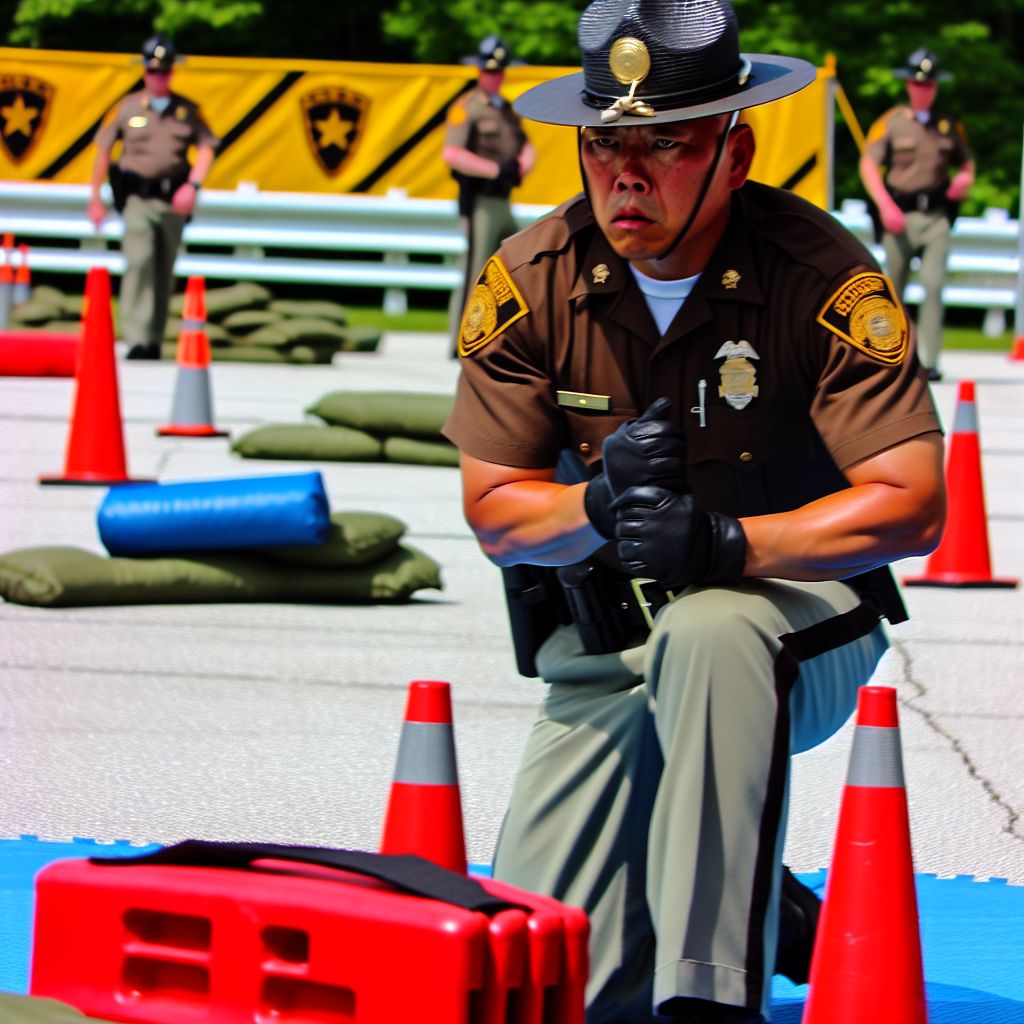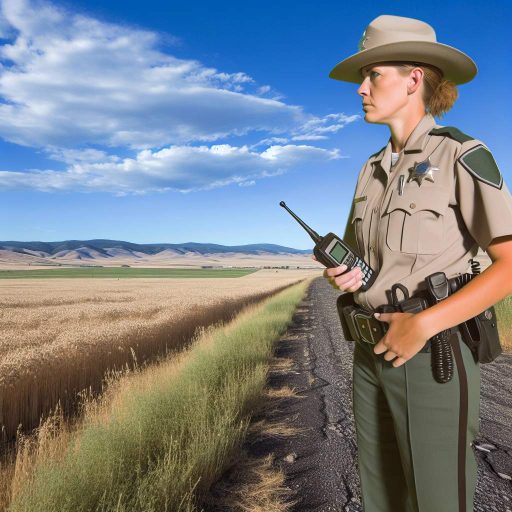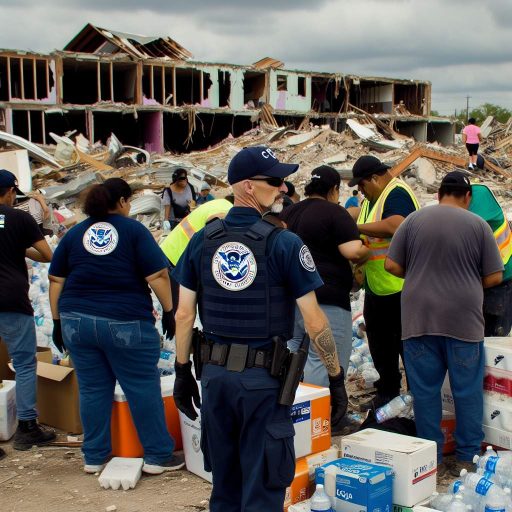Introduction
State troopers play a crucial role in maintaining public safety.
Their specialized training equips them with the necessary skills.
They handle various situations effectively.
Brief Overview of State Troopers
State troopers are law enforcement officers who patrol state highways.
They ensure traffic laws are obeyed.
Troopers also respond to emergencies.
They assist in enforcing state laws.
Importance of State Trooper Training
State trooper training is essential for public safety.
This training upholds the law.
Training covers a wide range of topics.
Topics include defensive tactics, firearms proficiency, and emergency response procedures.
Overview of State Trooper Training
State troopers are law enforcement officers who are responsible for enforcing traffic laws.
They investigate crashes and provide assistance to motorists on state highways.
Becoming a state trooper requires rigorous training to ensure that officers are prepared for the demands of the job.
Length of Training Programs Varies by State
State trooper training programs vary in length depending on the state.
Some states may require a few months of training, while others may have programs that last up to a year.
For example, the Pennsylvania State Police Academy requires recruits to complete a 27-week training program.
This program includes classroom instruction, physical training, and practical exercises.
On the other hand, the Florida Highway Patrol’s training program lasts for 28 weeks.
Common Elements of Training Programs
Regardless of the length, there are common elements that are found in most state trooper training programs.
Transform Your Career Today
Unlock a personalized career strategy that drives real results. Get tailored advice and a roadmap designed just for you.
Start Now- Physical Fitness: State troopers need to be in top physical condition to perform their duties effectively.
- Firearms Training: State troopers are required to carry firearms as part of their duties.
- Legal Education: State troopers need to have a solid understanding of state and federal laws.
Importance of Meeting Specific Requirements to Become a State Trooper
In addition to completing a state trooper training program, individuals who wish to become state troopers must meet specific requirements.
- Age: Most states require state trooper recruits to be at least 21 years old.
- Education: Some states may require a high school diploma or equivalent, while others may require a college degree.
- Physical Fitness: Recruits must pass a physical fitness test to demonstrate that they are in good physical condition.
- Criminal Background Check: Applicants must have a clean criminal record to be eligible for a state trooper position.
Meeting these requirements is essential to becoming a state trooper and successfully completing the training program.
State troopers play a vital role in ensuring public safety and enforcing traffic laws.
This makes their training and qualifications crucial to their success in the field.
Physical Fitness Requirements
Maintaining physical fitness is crucial for state troopers.
It allows them to effectively perform their duties.
Importance of Physical Fitness
Being physically fit enables state troopers to chase suspects.
It also helps them respond quickly in emergency situations.
Typical Physical Fitness Tests
In training programs, state troopers undergo various physical tests.
These may include running, push-ups, sit-ups, and obstacle courses.
Strategies for Preparing
To prepare for physical fitness requirements, candidates should prioritize exercise.
A mix of cardio, strength training, and flexibility exercises is beneficial.
Maintain a Regular Exercise Routine
Consistency is key to improving physical fitness.
Candidates should incorporate a variety of exercises into their routine.
Cardiovascular Endurance Training
Running, cycling, and swimming are great for building endurance.
These activities improve heart health and stamina.
Strength Training
Weightlifting and bodyweight exercises help build muscle strength.
Strong muscles are essential for tasks like lifting, pushing, and pursuit.
Flexibility Exercises
Yoga, stretching, or Pilates can enhance flexibility.
Showcase Your Business Today
Reach thousands of readers actively exploring professional services. Publish your business profile and grow your audience now.
Publish NowBeing flexible reduces the risk of injuries during physical activities.
Practice Specific Test Components
Candidates should familiarize themselves with the test requirements.
This helps them understand what to expect and work on areas of weakness.
Uncover the Details: Impact of Technology on Highway Patrol Operations
Firearms Training
State trooper training is comprehensive.
This training covers a wide range of skills and disciplines.
It ensures that officers are fully prepared for challenges.
One critical aspect is firearms proficiency.
This skill is essential for every state trooper.
Essential Skills Taught During Firearms Training
During firearms training, state troopers learn various essential skills.
These skills are crucial for their effectiveness in the field.
Some of the skills include marksmanship, weapon handling, and defensive tactics.
They also learn situational awareness and decision-making under pressure.
Importance of Firearms Proficiency for State Troopers
Firearms proficiency is of utmost importance for state troopers.
Troopers are often required to use deadly force in dangerous situations.
A high level of proficiency ensures they can effectively handle their firearms.
This is vital in high-stress situations.
Overview of Shooting Drills and Exercises Practiced During Training
To develop and maintain proficiency, troopers undergo regular shooting drills.
These drills include target practice and shooting while moving.
They practice shooting from cover and transition drills.
Scenario-based training simulates real-life situations.
Additionally, state troopers are trained with various firearms.
This includes handguns, shotguns, and rifles.
Training with different weapons ensures proficiency on the job.
Diversity in training equips troopers to respond effectively to threats.
Gain More Insights: How to Protect High-Profile Clients
Legal education
State trooper training includes a thorough understanding of state laws and regulations.
Legal knowledge is crucial for making informed decisions while on duty.
State troopers must be well-versed in legal matters to protect the rights of citizens.
Legal education plays a significant role in upholding the law and maintaining order.
Importance of legal knowledge
State troopers need to have a deep understanding of state laws and regulations.
Legal knowledge allows troopers to make informed decisions in various situations.
Having a strong foundation in legal matters helps troopers uphold justice.
State troopers are responsible for enforcing the law and protecting citizens’ rights.
Legal knowledge is essential for state troopers to perform their duties effectively.
Role of legal education
Legal education serves as the backbone of state trooper training.
Understanding state laws is crucial for ensuring compliance with regulations.
Troopers rely on legal knowledge to navigate complex legal situations on duty.
Legal education enables troopers to uphold the law and protect the community.
State troopers must constantly update their legal knowledge to adapt to changing laws.
Showcase Your Business Today
Reach thousands of readers actively exploring professional services. Publish your business profile and grow your audience now.
Publish NowExplore Further: Technology Used by ICE Agents in Their Work

De-escalation and Conflict Resolution Training
De-escalation and conflict resolution training are crucial components of state trooper training.
These skills are essential for maintaining public safety, reducing the likelihood of violent confrontations, and building trust within communities.
Importance of De-escalation Techniques in Law Enforcement
- De-escalation techniques help state troopers defuse tense situations without resorting to physical force.
- Using de-escalation tactics can prevent escalation of conflicts and minimize the risk of injuries to both officers and citizens.
- Effective de-escalation can help resolve potentially volatile situations peacefully, leading to safer outcomes for all parties involved.
Strategies for Defusing Tense Situations and Resolving Conflicts Peacefully
- Active listening is a key strategy in de-escalation, as it allows officers to better understand the concerns and emotions of individuals they encounter.
- Remaining calm and composed in high-pressure situations can help officers project a sense of control and authority, which can help de-escalate conflicts.
- Offering alternatives and providing opportunities for individuals to cooperate can also be effective in resolving conflicts peacefully.
Role of Communication Skills in Maintaining Public Safety and Building Community Trust
- Effective communication skills are essential for state troopers to establish rapport with community members and gain their cooperation.
- Clear and concise communication can help prevent misunderstandings and diffuse potentially tense interactions before they escalate.
- Building trust through open and honest communication can also help improve community relations and foster cooperation in crime prevention efforts.
De-escalation and conflict resolution training are vital aspects of state trooper training.
By equipping officers with the necessary skills to defuse tense situations, resolve conflicts peacefully, and communicate effectively, law enforcement agencies can promote public safety, build community trust, and minimize the use of force in their interactions with the public.
Explore Further: Client Onboarding Process for Security Consultants
Field training and on-the-job experience
State trooper training goes beyond classroom sessions.
Trainees experience real-life scenarios during field training.
On-the-job experience is vital for applying theoretical knowledge.
Transition from training programs to real-world scenarios
Trainees must adapt quickly to the demands of law enforcement.
Field training bridges the gap between theory and practical application.
Learning to think on their feet is crucial for state troopers.
Importance of applying skills learned in training to actual law enforcement situations
Training instills critical thinking and decision-making abilities.
State troopers must be able to apply training under pressure.
Effective application of skills ensures public safety and law enforcement efficiency.
Mentorship and supervision during the initial stages of a state trooper’s career
Seasoned officers provide guidance and support to new recruits.
Mentorship helps state troopers navigate challenges in the field.
Supervision ensures trainees adhere to departmental policies and procedures.
Key Training Aspects for State Troopers
We covered the intense physical, mental, and emotional training that aspiring state troopers undergo before hitting the road.
State troopers must be prepared for any situation they may encounter.
From firearms proficiency to defensive tactics, rigorous training is essential.
Continuing education ensures troopers stay up-to-date on laws, technology, and best practices in law enforcement.
This ongoing training helps them better protect and serve their communities.
Additional Resources
Chapter 63. – Title 23 – DOMESTIC RELATIONS
Ohio State Highway Patrol | Ohio.gov
[E-Books for Sale]
The Big Book of 500 High-Paying Jobs in America: Unlock Your Earning Potential
$19.99 • 500 High-Paying Jobs • 330 pages
Explore 500 high-paying jobs in America and learn how to boost your career, earn more, and achieve success!
See All 500 High-Paying Jobs of this E-Book
1001 Professions Without a Degree: High-Paying American Jobs You Can Start Now
$19.99 • 1001 Professions Without a Degree • 174 pages
Discover 1001 high-paying jobs without a degree! Unlock career tips, skills, and success strategies for just $19.99!




